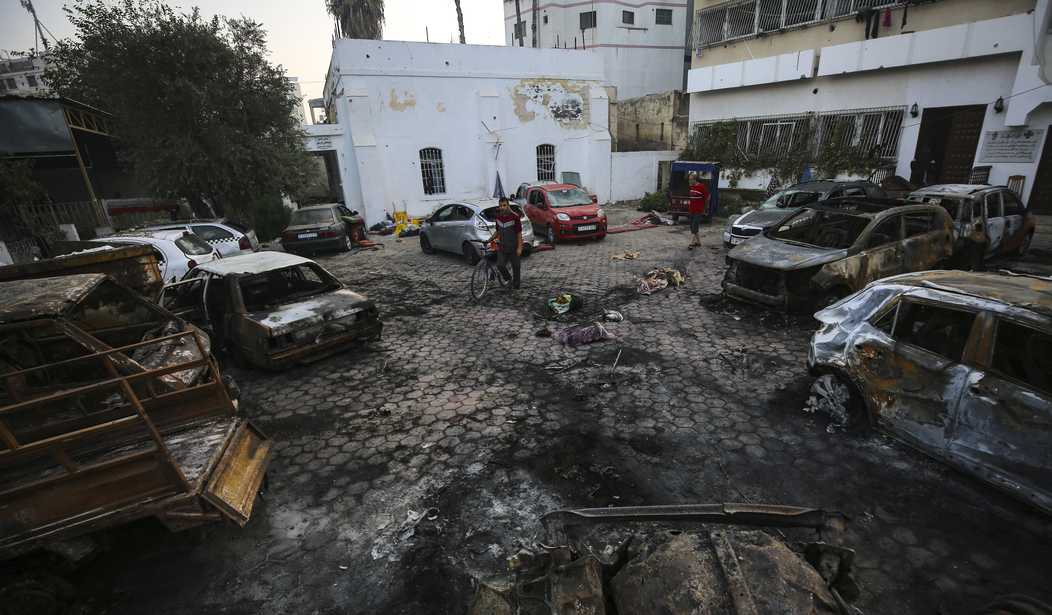More information and assessments of the Gaza hospital explosion continue to come in. The latest report from the BBC spoke to multiple outside experts. Those who responded agreed the scene of the blast is not consistent with an Israeli airstrike.
We contacted 20 think tanks, universities and companies with weapons expertise. Nine of them are yet to respond, five would not comment, but we spoke to experts at the remaining six…
J Andres Gannon, an assistant professor at Vanderbilt University, in the US, says the ground explosions appeared to be small, meaning that the heat generated from the impact may have been caused by leftover rocket fuel rather than an explosion from a warhead.
Justin Bronk, senior research fellow at the UK-based Royal United Services Institute, agrees. While it is difficult to be sure at such an early stage, he says, the evidence looks like the explosion was caused by a failed rocket section hitting the car park and causing a fuel and propellant fire…
Valeria Scuto, lead Middle East analyst at Sibylline, a risk assessment company, notes that Israel has the capacity to carry out other forms of air strike by drone, where they might use Hellfire missiles. These missiles generate a significant amount of heat but would not necessarily leave a large crater. But she says uncorroborated footage shows a pattern of fires at the hospital site that was not consistent with this explanation.
The BBC also notes that the lack of a large crater at the site has been pointed to by the IDF as a sign this was not an Israeli missile strike. But the BBC notes that some have suggested the lack of a crater might be explained by the use of an “airburst” bomb which explodes just before impact.
The BBC isn’t naming names but that suggestion was included in a UK Channel 4 news report on the hospital which stated that while the site did not match an Israeli missile an airburst munition couldn’t be ruled out. However, the BBC reports today that “the experts we spoke to said the blast scene was not consistent with this.”
Another element of the Palestinian version of events is also getting some much needed scrutiny today, i.e. the claim that 500 people were killed in the attack. CNN just published a story about that which suggests the actual death toll was significantly lower.
The unclassified assessment sent to Capitol Hill by the Office of the Director of National Intelligence adds more detail to the US intelligence community’s initial assessment released Wednesday that Israel was not responsible for the strike on the hospital.
“Israel Probably Did Not Bomb Gaza Strip Hospital: We judge that Israel was not responsible for an explosion that killed hundreds of civilians yesterday [17 October] at the Al Ahli Hospital in the Gaza Strip,” the assessment states. “Our assessment is based on available reporting, including intelligence, missile activity, and open-source video and images of the incident.”
The US intelligence community also estimates the number of deaths from the hospital at the “low end of the 100-to-300 spectrum,” according to the assessment, a lower number than figures initially cited by Hamas of more than 500.
Other reports out today suggest the death toll was even lower:
Hamas massively inflated the death toll of Tuesday’s blast near the Gaza Strip’s Al Ahli Arab Hospital, as it tried to pin the incident on the Israeli military, a European intelligence official told the Agence France-Presse.
“There weren’t 200 or even 500 deaths. More likely between 10 and 50,” the anonymous source, told the news agency.
I think the US intel report is probably more accurate than an anonymous European source at this point but maybe this guides us toward the lower end of the US range.
That still means several dozen civilians were killed but it’s revealing that Hamas inflated the numbers and much of the US media just went with what they were told. Hamas understood the propaganda value of inflating these numbers and the media should have understood that as well. And now it’s probably too late to fix it. An unnamed US official told CNN, “Unfortunately, the narratives have already spread and solidified at this point.”








Join the conversation as a VIP Member